
PUMPA - SMART LEARNING
எங்கள் ஆசிரியர்களுடன் 1-ஆன்-1 ஆலோசனை நேரத்தைப் பெறுங்கள். டாப்பர் ஆவதற்கு நாங்கள் பயிற்சி அளிப்போம்
Book Free DemoIn the previous section, we saw the types of wastes. Let us now see from where these wastes are coming from? The below picture represents the percentage of the different sources of waste in Chennai.
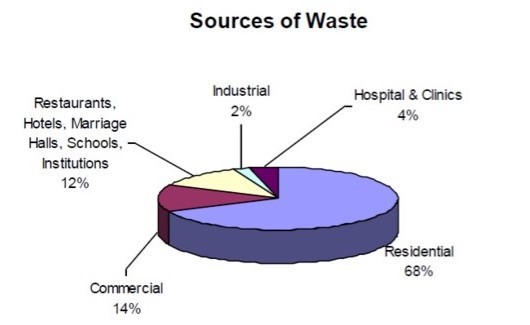
Sources of wastes:
1. Domestic wastes:
Paper, plastics, vegetable wastes, glass, textiles, and other household wastes include domestic wastes.
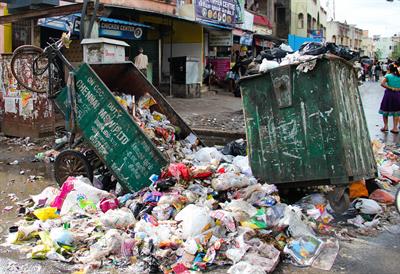
Domestic wastes
2. Commercial wastes:
The garbage generated in commercial establishments such as shops, stores, printers, offices, and godowns is commercial waste.
Example:
Packing material, polythene, paper, damaged foods, vegetable and meat scraps, and other items are included.
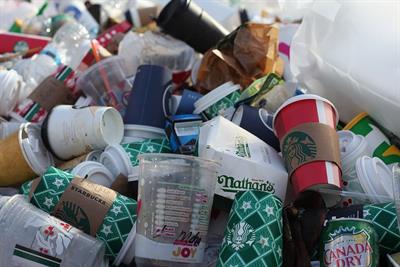
Paper cups used in restaurants and coffee shops
Ashes are produced by the combustion of solid fossil fuels such as coal, wood, and coke. These fuels are used in many homes and roadside cafes.
3. Animal wastes:
Animal wastes include the dung of stray animals left on the streets.
4. Biomedical wastes:
Biomedical wastes are generated from clinics and hospitals, such as expired medications, plastic syringes, surgical dressings, etc. These wastes can be infectious and have the potential to spread.
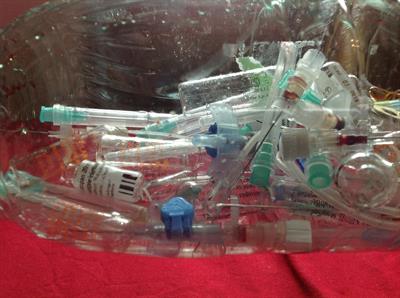
Biological wastes
5. Construction wastes:
Construction wastes are generated as a result of construction activity in urban areas. Metal rods, cement, concrete, sand, etc., fall into this category. These wastes can also be generated by power, drainage and telephone departments.
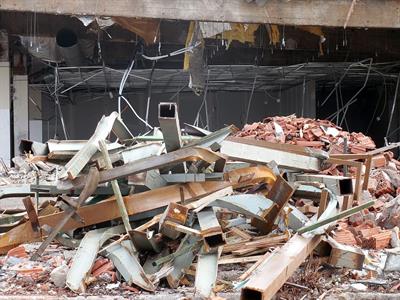
Construction wastes
6. Sewage wastes:
After cleaning, the sewer removed from the sewerage is dumped on the roadside, posing several health hazards to the general population.
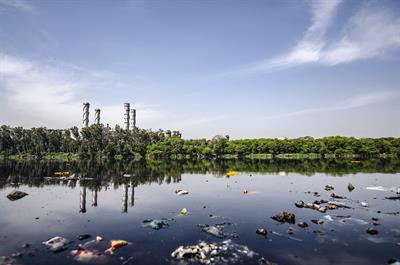
Sewage wastes dumped in a nearby water body
7. Hazardous wastes:
Hazardous wastes are combustible easily, explode when exposed to air or water, corrode other materials, and are toxic or radioactive.
8. Electronic wastes (E-wastes):
E-wastes are made up of discarded electronic devices such as televisions, floppies, computers, audio-video CDs, electric switches, batteries, telephones, cellphones, refrigerators, washing machines, air conditioners, kitchen appliances, aeroplanes, etc.
These items contain toxic compounds such as lead, cadmium, mercury, barium, and carcinogens such as carbon black and heavy metals. The garbage handlers may suffer from serious health problems when handling the lethal mixture. It could be fatal too.
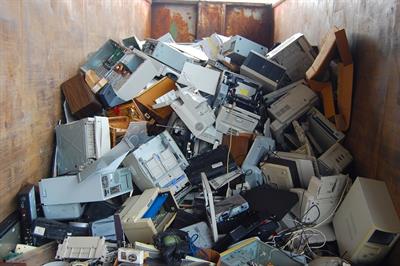
Electronic wastes
Reference:
https://chennai.citizenmatters.in/chennais-garbage-long-journey-ahead-to-sustainable-waste-management-129
https://www.flickr.com/photos/indiawaterportal/23515619515/in/photostream/
https://www.pxfuel.com/en/free-photo-qzmpi
https://pixabay.com/fi/photos/ruiskuja-injektio-332713/
https://www.pxfuel.com/en/free-photo-jizuf
https://pixabay.com/fi/photos/saastuminen-veden-saastuminen-j%c3%a4rvi-4286704/
https://www.maxpixel.net/Computer-Old-Technology-E-Waste-Garbage-Scrap-2049019